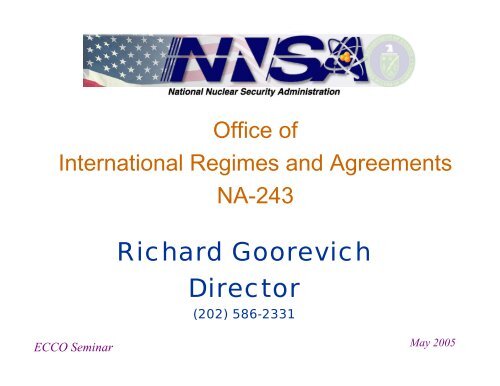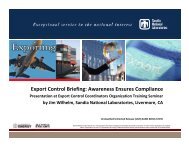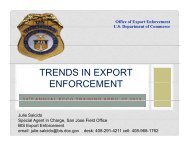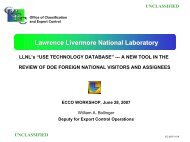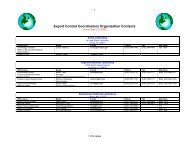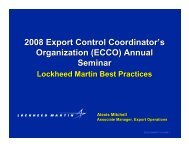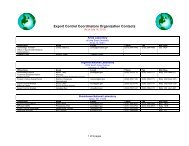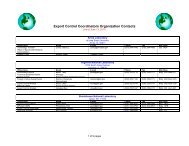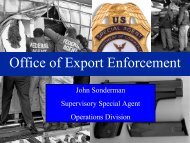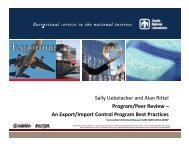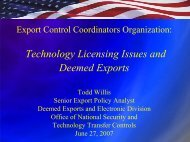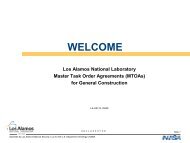Richard Goorevich Director
Richard Goorevich Director
Richard Goorevich Director
- No tags were found...
You also want an ePaper? Increase the reach of your titles
YUMPU automatically turns print PDFs into web optimized ePapers that Google loves.
Office of<br />
International Regimes and Agreements<br />
NA-243<br />
<strong>Richard</strong> <strong>Goorevich</strong><br />
<strong>Director</strong><br />
(202) 586-2331<br />
ECCO Seminar May 2005
NA-243: Technical Lead on<br />
Nuclear Technology for USG<br />
Functional Overview<br />
Domestic Controls<br />
International Controls<br />
Other<br />
DOE Complex Industry Multilateral Safeguards<br />
•Support to<br />
•DHS/CBP<br />
•DHS/ICE<br />
•DHS/U.S. Coast Guard<br />
•FBI<br />
• DOC/BIS/EE<br />
•Surplus Equipment<br />
• Deemed Exports<br />
•Nuclear Software<br />
•CRADAs<br />
•NCI/IPP<br />
•NP Seminar Series<br />
•ECI<br />
•Part 810<br />
Authorizations<br />
•Munitions<br />
•Dual-Use<br />
•NRC Assurances<br />
•NSG<br />
•Zangger Cmtee<br />
•Wassenaar Arrgmt.<br />
•Add’l Protocol<br />
•MTCR/AG<br />
•Safeguards<br />
Policy<br />
•Additional Protocol<br />
Implementation<br />
•IAEA Board of<br />
Governors and<br />
General Conference<br />
2
NA-20<br />
DEFENSE NUCLEAR NONPROLIFERATION<br />
Deputy Administrator - Paul M. Longsworth<br />
NA-24<br />
ADA Cheri Fitzgerald<br />
DADA Cynthia Lersten<br />
Acting Policy <strong>Director</strong><br />
Adam Scheinman<br />
OFFICE OF DISMANTLEMENT<br />
& TRANSPARENCY<br />
<strong>Director</strong> - Kurt Siemen<br />
OFFICE OF INTERNATIONAL<br />
REGIMES & AGREEMENTS<br />
<strong>Director</strong> - Rich <strong>Goorevich</strong><br />
Budget - Lynn Ashby (FED)<br />
Admin - Renetta Zanco (GEM)<br />
Travel - Joanne Frysiak (GEM)<br />
OFFICE OF GLOBAL SECURITY,<br />
COMPLIANCE & COOPERATION<br />
<strong>Director</strong> - Monte Mallin<br />
LICENSING OPERATIONS AND COMPLIANCE<br />
Deputy <strong>Director</strong> - Anatoli Welihozkiy<br />
PINS – Barbara McIntosh<br />
U.S. Domestic Export Licensing<br />
(DOC/DOS/NRC/810s)<br />
DOE-Complex issues associated w/equipment<br />
and technology<br />
Interagency enforcement support<br />
COUNTERING PROLIFERANT NETWORKS<br />
Deputy <strong>Director</strong> - Bob Swartz<br />
Coordinates the following IRA crosscutting activities:<br />
Proliferation networks coordination (PSI … )<br />
Asian Affairs<br />
NON-NUCLEAR SECURITY<br />
Team Leader - Vacant<br />
NUCLEAR SUPPLY & TRANSFERS<br />
Team Leader - Melissa Krupa<br />
NUCLEAR TREATIES & AGREEMENTS<br />
Team Leader - Sean Oehlbert<br />
NUCLEAR SAFEGUARDS<br />
Team Leader – Jon Phillips<br />
INTERNATIONAL TREATIES<br />
Biological Weapons Convention (BWC)<br />
MULTILATERAL ARRANGEMENTS<br />
Australia Group<br />
Missile Technology Control Regime<br />
Wassenaar Arrangement<br />
DOMESTIC (NON-NUCLEAR LICENSING)<br />
International Traffic in Arms Regulations (ITAR)<br />
Export Administration Regulations (EAR)<br />
Non-Nuclear Interdiction Groups<br />
(MTAG/Shield)<br />
Sanctions Work<br />
Team Leader Vacancy<br />
Michael Bedke<br />
Aysun Scott<br />
Mark Kinglsey<br />
CBW/MT Vacancy<br />
DOMESTIC (NUCLEAR LICENSING)<br />
Nuclear Referral List from EAR / ITAR<br />
Technology Transfers (Part 810)<br />
Nuclear Interdiction (NIAG)<br />
Classified Tech Transfer<br />
MULTILATERAL ARRANGEMENTS<br />
NPT Exporters Committee (Zangger<br />
Committee)<br />
Nuclear Suppliers Group (NSG)<br />
IAEA AFFAIRS<br />
NUTRAN<br />
Physical Protection: Bilats, IPPAS, CPPNM,<br />
INFCIRC/225<br />
Code of Conduct of RAD Sources<br />
Melissa Krupa<br />
Tatiana Delorm<br />
Ed Fox<br />
Russ Hibbs<br />
Zan Hollander<br />
Heather Looney<br />
Kim Mamodo<br />
Drew Nickels<br />
Carl Thorne<br />
Arthur Wendel<br />
MULTILATERAL AFFAIRS<br />
Conference on Disarmament<br />
<br />
NUCLEAR TREATIES<br />
Treaty on the Non-Proliferation of<br />
Nuclear Weapons (NPT)<br />
- Technical Cooperation Program<br />
Nuclear Weapons Free Zones (NWFZ)<br />
- Treaty of Tlatelolco<br />
- Treaty of Rarotonga<br />
- Bangkok Treaty<br />
- Pelindaba Treaty<br />
Fissile Material Cutoff Treaty (FMCT)<br />
BILATERAL AGREEMENTS FOR<br />
PEACEFUL COOPERATION<br />
(AEA SECTION 123)<br />
Administrative Arrangements<br />
Subsequent Arrangements<br />
Nuclear Material Management &<br />
Safeguards System (NMMSS)<br />
NRC Licensing<br />
Nuclear Non-Proliferation Workshops<br />
Sean Oehlbert<br />
Tatiana Delorm<br />
Judy Gibson<br />
Dunbar Lockwood<br />
Drew Nickels<br />
Carl Thorne<br />
Vacancy<br />
IAEA<br />
Safeguards Policy<br />
Additional Protocol Implementation<br />
U.S. Voluntary Offer (List of Eligible<br />
Facilities)<br />
Board of Governors<br />
TECHNICAL<br />
Proliferation Resistant Fuel Cycle<br />
Technologies (PRFCT)<br />
Safeguards Equipment Development<br />
Jon Phillips<br />
Michael Bedke<br />
Ron Cherry<br />
Zan Hollander<br />
Dunbar Lockwood<br />
John Murphy<br />
Ed Wonder<br />
7/21/2005 9:47 AM<br />
3
Nuclear Supply and<br />
Transfers
Nuclear and Non-Nuclear Security:<br />
Areas of Licensing Responsibility<br />
• Industry<br />
‣ Part 810 Specific and<br />
General Authorizations<br />
‣ Dual-Use License Reviews<br />
‣ Chemical, Biological,<br />
Nuclear, Missile, and<br />
Electronic devices /<br />
Semiconductor<br />
Manufacturing Equipment<br />
‣ Munitions License Reviews<br />
‣ Sections 5 and 16:<br />
Explosives and Nuclear<br />
Weapon Design and Test<br />
Equipment<br />
‣ Assurance Requests for<br />
NRC Exports<br />
• DHS/CBP & ICE & U.S. Coast<br />
Guard; FBI; DOC/BIS/EE<br />
Support<br />
• DOE Complex<br />
‣ Maintain NP Guidelines/Sensitive<br />
Subjects/Countries Lists<br />
‣ Provide Guidance on:<br />
‣ Foreign Travel by DOE Funded<br />
Scientists and Engineers<br />
‣ Deemed Exports (Foreign Hires)<br />
‣ International Programs (IPP, NCI,<br />
MPC&A, etc.)<br />
‣ Surplus Property<br />
‣ ECI Review of DOE Publications<br />
‣ Review Transfer Nuclear Software<br />
‣ Provide NP Seminar Series<br />
‣ Support “Pit-Out” Reviews<br />
5
Nuclear and Non-Nuclear Security: Non-<br />
Licensing Areas of Responsibility<br />
• Multilateral Regime Support<br />
‣ Nuclear Suppliers Group<br />
‣ NPT Exporters Committee<br />
(Zangger)<br />
‣ International Atomic Energy<br />
Agency (IAEA)<br />
‣ Missile Technology Control<br />
Regime (MTCR)<br />
‣ Wassenaar & Australia Group (AG)<br />
• Other Issues<br />
‣ Bilaterals<br />
‣ IAEA Code of Conduct for<br />
Radioactive Sources<br />
‣ Interdiction (NIAG, President’s<br />
Proliferation Security Initiative (PSI)<br />
‣ Sanctions<br />
‣ NISS (NSG Information Sharing<br />
System)<br />
Physical Protection<br />
‣ Convention on the Physical<br />
Protection of Nuclear Material<br />
‣ IAEA INFCIRC/225 Updates<br />
‣ Physical Protection Bilateral<br />
Consultations<br />
• Technical Projects<br />
‣ Economic Globalization<br />
‣ Machine Tools<br />
‣ SNET List Review<br />
‣ Technical Review Group<br />
‣ Commercialization of DOE lab technology<br />
(CRADAs)<br />
‣ Stable Isotope Separation<br />
‣ Graphite Controls<br />
‣ Proliferation Research and Analysis (PRAP)<br />
Projects<br />
‣ Proliferation Trade Control <strong>Director</strong>y<br />
(PTCD)<br />
6
Nuclear Supply & Transfers:<br />
Multilateral Export Controls<br />
Purpose:<br />
• Prevent the proliferation of nuclear weapons by:<br />
– delaying a nuclear program and allowing other means, such as<br />
diplomacy, to help;<br />
– causing an end-user to accept a less capable and more costly<br />
option; and<br />
– allowing for countries to take a principled position on nuclear<br />
nonproliferation<br />
7
Nuclear Supply & Transfers:<br />
Multilateral Export Controls<br />
Strategies:<br />
• Strengthen the multilateral<br />
supplier regimes through<br />
continued U.S. technical<br />
leadership<br />
• Cooperate with the U.S.<br />
interagency, DOE and<br />
NNSA offices, and likeminded<br />
multilateral partners<br />
to promote peaceful nuclear<br />
trade and nonproliferation<br />
objectives<br />
Strategies<br />
• Promote adherence to<br />
multilateral nuclear<br />
supplier arrangements in<br />
support of USG<br />
nonproliferation policy<br />
• Ensure that the NNSA<br />
program offices and<br />
contractors are fully<br />
apprised of all multilateral<br />
commitments and<br />
obligations<br />
8
Nuclear Supply & Transfers: Technical<br />
and Nonproliferation Studies<br />
Mission:<br />
• Initiate studies on rapidly developing technologies and<br />
initiatives before problems arise<br />
– Technical studies: Accelerator Production of Tritium; Naval<br />
Reactor Technologies<br />
– Multilateral negotiations: Conversion technologies; Plutonium<br />
Isotope Separation<br />
– Policy studies: Globalization study<br />
• Pursue an active role in preventing proliferation.<br />
• Protect U.S. national security interests and peaceful nuclear<br />
trade.<br />
• Conceptual change from “export control” to “supplier<br />
policy.”<br />
9
MULTILATERAL SUPPLIER GROUP<br />
MEMBERSHIP<br />
• As of the 2004 Plenary in Sweden, the newest NSG members are: China,<br />
Estonia, Lithuania and Malta. (Date of Information: June 2005)<br />
Argentina Greece Romania<br />
Australia Hungary Russia<br />
Austria Ireland Slovakia<br />
Belarus (NSG only) Italy Slovenia<br />
Belgium Japan South Africa<br />
Brazil Kazakhstan (2002) Spain<br />
Bulgaria Korea, Republic of Sweden<br />
Canada Latvia Switzerland<br />
China (2004) Lithuania (2004) Turkey<br />
Cyprus (NSG only) Luxembourg Ukraine<br />
Czech Republic Malta (2004) United Kingdom<br />
Denmark Netherlands United States<br />
Estonia (2004)<br />
New Zealand<br />
Finland<br />
Norway<br />
France<br />
Poland<br />
Germany<br />
Portugal<br />
10
Nuclear Supply & Transfers:<br />
Physical Protection<br />
• Amending the Convention on the Physical Protection of<br />
Nuclear Material (CPPNM) to address new post-9/11<br />
nuclear terrorism concerns<br />
• Updating IAEA INFCIRC/225 to address these new<br />
nuclear security concerns and threats<br />
• Bilateral Physical Protection Consultations and Visits:<br />
‣to evaluate the application of physical protection<br />
measures for exported U.S.-origin materials as outlined<br />
in the Atomic Energy Act and Nuclear Nonproliferation<br />
Act as export license requirements!<br />
The new structure of NA-243 allows the coordination of these<br />
two important elements of nuclear transfer security: export<br />
controls and physical protection requirements!<br />
11
Non-Nuclear Security
Non-Nuclear Security<br />
• Since FY03, NA-243 has been reviewing missile<br />
and chem-bio export license cases<br />
• Participation in missile and chem/bio multilateral<br />
regimes: Australia Group, Biological Weapons<br />
Convention and MTCR<br />
• Non-nuclear interdiction groups: MTAG, Shield<br />
• Technical and Nonproliferation Studies<br />
• Technical Review Group to identify cross-over<br />
items controlled for both nuke & missile reasons<br />
13
Nuclear Treaties & Agreements
Nuclear Treaties & Agreements<br />
• Subsequent<br />
Arrangements<br />
• Nuclear<br />
Nonproliferation Treaty<br />
(NPT)<br />
• Conference on<br />
Disarmament<br />
• Fissile Material Cutoff<br />
Treaty (FMCT)<br />
• Nuclear Weapons Free<br />
Zones<br />
• Nuclear Material<br />
Management &<br />
Safeguards System<br />
(NMMSS)<br />
• DOE’s Nuclear<br />
Nonproliferation<br />
Seminars<br />
• IAEA Technical<br />
Cooperation Program<br />
15
Nuclear Safeguards
Nuclear Safeguards<br />
• Safeguards Policy<br />
• Safeguards Equipment Development (w/NA-242)<br />
• IAEA Board of Governors and IAEA General<br />
Conference Support<br />
• Additional Protocol implementation<br />
• Proliferation Resistant Fuel Cycle Technologies<br />
• U.S. Voluntary Offer (List of Eligible Facilities)<br />
17
Technology Transfer Control<br />
Objectives:<br />
• To identify materials, equipment, and technology of<br />
proliferation concern<br />
• To prevent transfers to proliferants (through foreign<br />
national visits and assignments in DOE complex)<br />
• To protect against inadvertent transfers (of ECI and<br />
proprietary data)<br />
• To weigh proliferation and security concerns against value<br />
of scholarship, technology advance, and economic benefit<br />
• To implement U.S. Government policy on transfers of<br />
materials, equipment, and technology<br />
18
Technology Transfer Control<br />
Mechanisms of Transfer:<br />
• Sales, donations, loans, leases, exports<br />
• Technical exchanges and communications<br />
• Work-for-others, Cooperative Agreements, patent<br />
assignments<br />
• Publications and presentations<br />
• Visits and assignments to DOE sites<br />
• Foreign travel by DOE personnel<br />
19
Technology Transfer Control<br />
Transfer Control Principle:<br />
• Whatever the transfer mechanism, export control review is<br />
mandatory by U.S. law and regulation<br />
Control Measures:<br />
• Export control review of all proposed transfers, exchanges,<br />
publications, presentations, visits and assignments, and<br />
foreign travel<br />
• Export control requirements placed in all transfer<br />
agreements<br />
• DOE/NNSA approval required for retransfers<br />
20
Technology Transfer Control<br />
Areas under 30-day export control review by DOE<br />
• Nuclear Suppliers Group (NSG) list<br />
• Missile Technology Control Regime (MTCR) list<br />
• Australia Group (AG) chemical and biological warfare related<br />
list<br />
• Category 3:<br />
• Export control regulations – Departments of Energy,<br />
Commerce, and State, and Nuclear Regulatory Commission<br />
• DOE/NNSA<br />
‣ Guidelines on Export Control and Nonproliferation<br />
‣ Sensitive Countries List<br />
‣ Sensitive Subjects List<br />
‣ Technology experts and export control personne<br />
21
DOE Guidelines on Export Control<br />
and Nonproliferation Updated<br />
• Separated export control concerns for equipment and technology.<br />
• Added more footnotes for technical background.<br />
• Sale of equipment in the U.S. is not a deemed export, if sale is open to public. ***<br />
• Added more info on Part 810 authorizations.<br />
• Added more on exceptions and exemptions.<br />
• Updated ECI markings.<br />
• Emphasized the NSG, SSL, NTRB are just references, the governing documents<br />
are the laws and regulations.<br />
• *** Proposed DOC regulation in F.R. (May 27 th comment deadline) on “use” would<br />
be deemed export if export controlled equipment is “operated”.<br />
22
Guidelines (continued)<br />
• Added a statement about originating organization using discretionary publication<br />
control over EAR 99 unclassified information that might be a proliferation<br />
concern.<br />
• Added a reference to the Federal Property Regulations.<br />
• Added a 5-year record retention period for the export or deemed export of ECI.<br />
• Added a note that property transfer approval be addressed in the initial funding<br />
document.<br />
• Added a section on the prerelease of software.<br />
• Added Appendix 3 on DOE directives.<br />
• General update and editing<br />
23
Export Controlled Information (ECI)<br />
Export Controlled Information (ECI) - Technical<br />
information whose export requires a license<br />
• ECI should be protected if uncontrolled dissemination would<br />
adversely affect U.S. national security or nonproliferation<br />
objectives<br />
• DOE policy on dissemination of ECI must balance<br />
commitments to:<br />
‣ U.S. nonproliferation and national security goals<br />
‣ Scientific and technological advance<br />
‣ Benefit to U.S. industry<br />
‣ Benefit to U.S. taxpayer<br />
‣ Freedom of Information Act (FOIA) requirements<br />
24
Export Controlled Information (ECI)<br />
ECI (continued):<br />
• Restricting release of ECI:<br />
‣ Publications:<br />
• Edit sensitive data<br />
• Limit distribution<br />
‣ Presentations:<br />
• Edit sensitive data<br />
• Limit audience<br />
25
Surplus Property<br />
Transfer of Surplus Property:<br />
• Equipment and materials must be made useless for nuclear<br />
purposes<br />
• Transfer agreement must include strict nonproliferation conditions<br />
• There is a presumption of destruction for NSG Trigger list items<br />
and for weapons components<br />
• For items deemed too valuable to destroy:<br />
‣ Request exception from DOE/NNSA Deputy Administrator for<br />
Defense Nuclear Nonproliferation<br />
‣ May require modifying equipment to render it useless for nuclear<br />
purposes<br />
‣ Must get DOE/NNSA approval for retransfer or export<br />
26
Industry Export Control<br />
Dual-Use Export Licensing:<br />
• Export Administration Act of 1979 gives Commerce the<br />
lead<br />
• Export Administration Regulations (EAR) implements<br />
Sections of note:<br />
– 15 CFR Part 738, Special Country Policies<br />
– 15 CFR Part 742, Control Policy -- CCL Based Controls<br />
– 15 CFR Part 744, Control Policy -- End-User and End-Use<br />
Based Catch-All Controls<br />
– 15 CFR Part 752, Special Comprehensive Licenses<br />
– 15 CFR Part 774, Commerce Control List (includes Nuclear<br />
Referral List)<br />
27
Industry Export Control<br />
Munitions Licensing:<br />
• Under jurisdiction of the Department of State, Office of<br />
Defense Trade Controls<br />
• International Traffic in Arms Regulations, 22 CFR Part 121<br />
• DOE reviews nuclear-related cases<br />
– Category V - Explosives, Propellants, Incendiary Agents<br />
– Category XVI - Nuclear Weapons Design and Test Equipment<br />
• Authority<br />
– Arms Export Control Act 1976<br />
• Review process similar to dual-use cases, except without<br />
time limits or escalation<br />
28
Industry Export Control<br />
NRC Exports:<br />
• Nuclear exports requiring special or general licenses<br />
• 10 CFR Part 110<br />
• Authority<br />
– Atomic Energy Act of 1954<br />
• DOE assists NRC in securing assurances from foreign<br />
governments that exports of nuclear materials and equipment<br />
will be for peaceful uses<br />
• DOE provides general license request confirmations<br />
29
New Export Control Initiatives<br />
• Developing a self-assessment program aimed at the<br />
DOE Complex. Elements being contemplated are<br />
sensitive subject list training, “deemed export”<br />
procedure review in Complex and export control<br />
classification procedures for high risk property.<br />
• Pilot funding has been provided to Sandia, ORNL and<br />
SRNL to examine high risk property classification.<br />
The self-assessment program is currently being<br />
developed by NA-243 with support from ORNL and<br />
SRNL.<br />
30
New Export Control Initiatives<br />
• To provide an aid to high risk property classification,<br />
and other NA-243 projects, a data base is under<br />
development, the Proliferation Trade Control<br />
<strong>Director</strong>y (PTCD), that will serve as a reference<br />
identifying export controlled equipment, material and<br />
components, their available images, U.S. and foreign<br />
suppliers, technical specifications, and Export Control<br />
Commodity Numbers (ECCNs) and cross - referenced<br />
Harmonized Tariff System Numbers.<br />
31
AREAS FOR ASSISTANCE<br />
• Continue to maintain existing and develop new expertise<br />
necessary to support NA-243 initiatives<br />
• Incorporate export licensing and nonproliferation awareness<br />
into security briefings for new personnel<br />
• In the interim, ensure that “deemed exports” and ECI<br />
applicability review are done for all foreign national visits<br />
and assignments and foreign travel by federal and contractor<br />
personnel<br />
• Target professional societies and groups of industry for<br />
nonproliferation awareness training<br />
• Actively participate in Nuclear Nonproliferation Workshops<br />
and Seminars<br />
32
NA-243 NEWS<br />
• Develop introductory export licensing and nonproliferation<br />
awareness material for new DOE and DOE contractor<br />
personnel to be distributed as part of security briefing<br />
• Expand outreach to scientific and technical communities to<br />
increase export licensing and nonproliferation awareness<br />
‣ Seek opportunities to promote awareness at professional<br />
society conventions and meetings, or through publications<br />
33
Forward Thinking for Export Licensing<br />
• New nuclear weapons reduction agreement with Russia will<br />
require increased nonproliferation effort<br />
• Propose to add a mandatory check-off block to FACTS to ensure<br />
that visited offices conduct “deemed exports” applicability<br />
review<br />
• Propose to add a mandatory check-off block to FTMS to ensure<br />
traveling official conduct export control applicability review<br />
• Develop an unclassified database of questions and responding<br />
guidance from NA-243<br />
– Categorize by areas of NA-243 responsibilities<br />
– Make accessible through the NA-243 web site<br />
– Continuously update database with newly posed questions<br />
34
The New Age of Export<br />
Controls<br />
Recent developments influencing<br />
export controls
The President’s Initiatives<br />
President Bush’s February 11 WMD speech at the<br />
National Defense University outlined a number of<br />
new initiatives, including initiatives related to<br />
export controls, to help mend the gaps in the<br />
nonproliferation regime which allow proliferators<br />
to acquire WMD-significant items and<br />
technologies<br />
• The Nuclear Suppliers Group and the G-8 are<br />
now working to adopt these measures<br />
36
New NSG Initiatives<br />
In his speech, the President specifically called on the NSG to<br />
implement some of these measures, including:<br />
• Establishing the Additional Protocol as a condition of<br />
supply by ‘05<br />
• Banning transfers of enrichment and reprocessing<br />
technologies<br />
• Suspending nuclear trade to states found in noncompliance<br />
with IAEA safeguards obligations<br />
These issues are now being deliberated within the NSG<br />
37
UNSCR 1540<br />
Another positive step for export controls was the passage<br />
of United Nations Security Council Resolution 1540<br />
in April 2004, which obligates all countries to:<br />
‣ Refrain from providing support in acquiring,<br />
manufacturing, transferring or using WMD<br />
‣ Adopt and enforce adequate export controls<br />
‣ Adopt and enforce transit, transshipment and<br />
retransfer controls<br />
‣ Work with their industries and public to inform<br />
them of these obligations<br />
38
Radioactive Source Export<br />
Controls<br />
The 2003 IAEA Code of Conduct on the Safety &<br />
Security of Radioactive Sources calls for import and<br />
export controls on a subset of radioactive sources<br />
which could be used in a “dirty bomb”<br />
• Over 40 countries developed import/export Guidance<br />
to support this objective<br />
• This import/export Guidance calls for end-use and<br />
end-user evaluations, notifications of shipments, and<br />
recipient authorization<br />
• The USG is currently developing regulations to<br />
uphold these import/export provisions, to go into<br />
effect January 1, 2006<br />
39
The New Frontier<br />
of Export Controls<br />
• Recent revelations such as the A. Q. Khan illicit<br />
procurement network demonstrate the need for<br />
strengthened export controls<br />
• The President’s Initiatives and the passage of<br />
UNSC Resolution 1540 emphasize the importance<br />
of export controls as a nonproliferation tool<br />
• PSI and other interdiction efforts are reinforcing<br />
export control efforts by interdicting illegallytransferred<br />
and/or illicitly-procured items<br />
What next for export controls<br />
40
THE END


